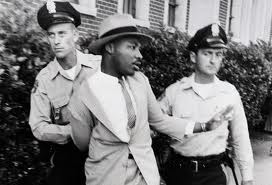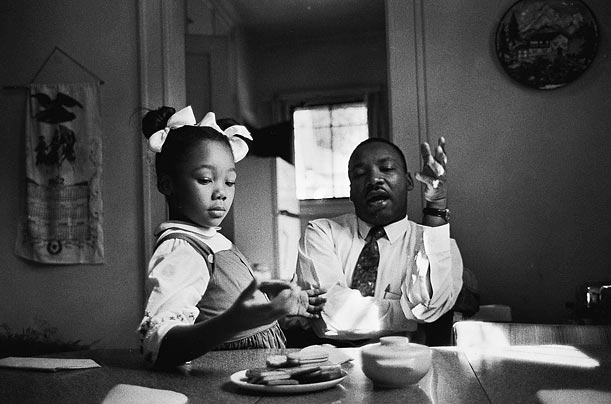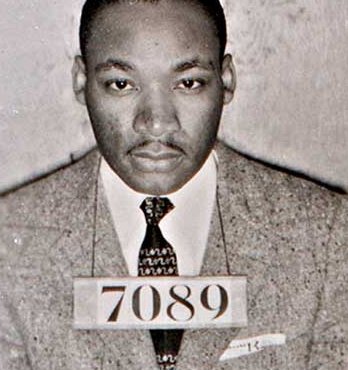How does one determine whether a law is just or unjust? A just law is a man made code that squares with the moral law or the law of God. An unjust law is a code that is out of harmony with the moral law. To put it in the terms of St. Thomas Aquinas: An unjust law is a human law that is not rooted in eternal law and natural law. Any law that uplifts human personality is just. Any law that degrades human personality is unjust. All segregation statutes are unjust because segregation distorts the soul and damages the personality. It gives the segregator a false sense of superiority and the segregated a false sense of inferiority. Segregation, to use the terminology of the Jewish philosopher Martin Buber, substitutes an “I it” relationship for an “I thou” relationship and ends up relegating persons to the status of things. Hence segregation is not only politically, economically and sociologically unsound, it is morally wrong and sinful. Paul Tillich has said that sin is separation. Is not segregation an existential expression of man’s tragic separation, his awful estrangement, his terrible sinfulness?
“Letter from Birmingham Jail” (1963)
 Martin Luther King day is here again. For many, it’s simply part of a three-day weekend and, thus, a time to sleep in. For others, MLK day has become yet another day to shop till you drop. It’s also a day where we are privy to various snippets from Dr. King’s “I Have a Dream” speech, played on loop and quoted by the most conservative pundits to the most liberal, although, quiet at it’s kept, he said many, many brilliant things.
Martin Luther King day is here again. For many, it’s simply part of a three-day weekend and, thus, a time to sleep in. For others, MLK day has become yet another day to shop till you drop. It’s also a day where we are privy to various snippets from Dr. King’s “I Have a Dream” speech, played on loop and quoted by the most conservative pundits to the most liberal, although, quiet at it’s kept, he said many, many brilliant things.
A few years ago, I had the pleasure of teaching a literature of the Civil Rights Movement (CRM) course. Although I live in Alabama, a state filled to the brim with vital civil rights history, many of my students knew very little about the CRM, and even less about King, even though they all claimed that he was very important or even a personal hero. It was during that time that I really fully recognized how limiting political sainthood is. All my students knew who MLK was (or thought they knew), but the information they had received about him was so sanitized and incomplete that his words and philosophy were simply platitudes trotted out once a year to underscore that we had achieved his Dream. Imagine their surprise when they read about King’s anti-war stance, his thoughts on capitalism, and his emerging radicalism towards the end of his life. Take, for instance, King’s words just months before his death:
And the leaders of the world today talk eloquently about peace. Every time we drop our bombs in North Vietnam, President Johnson talks eloquently about peace. What is the problem? They are talking about peace as a distant goal, as an end we seek, but one day we must come to see that peace is not merely a distant goal we seek, but that it is a means by which we arrive at that goal. We must pursue peaceful ends through peaceful means. All of this is saying that, in the final analysis, means and ends must cohere because the end is preexistent in the means, and ultimately destructive means cannot bring about constructive ends.
“A Christmas Sermon” (1967)
King’s sermon is not a series of platitudes but an admonition for our own time. Indeed, it’s high time that we take our icons, our saints, off the pedestal and really heed their advice. Keeping MLK and others as distant, perfect leaders is really a cop out, a way to assuage our guilt at being “inadequate” heirs to the Movement, or to fool ourselves into thinking we’ve achieved some “post-racial” paradise, or to convince ourselves that the task of liberation is just too daunting. On this MLK day, I think that we owe it not only to MLK’s memory, but to the many forgotten foot soldiers of the CRM and Black Power Movement, to do more than recite sound bites or raise our fists in mock salute. We need to remember the richness, the complexity, the contradictions, and the power of black political struggles in the U.S. and across the Diaspora, and continue not only believing that injustice anywhere is a threat to justice everywhere, but we must continue doing something about it–at home and in the streets.

- From Time.com: “King said in an interview that this photograph was taken as he tried to explain to his daughter Yolanda why she could not go to Funtown, a whites-only amusement park in Atlanta.King claims to have been tongue-tied when speaking to her. ‘One of the most painful experiences I have ever faced was to see her tears when I told her Funtown was closed to colored children, for I realized the first dark cloud of inferiority had floated into her little mental sky.'”


This statement: “Keeping MLK and others as distant, perfect leaders is really a cop out, a way to assuage our guilt at being “inadequate” heirs to the Movement, or to fool ourselves into thinking we’ve achieved some “post-racial” paradise, or to convince ourselves that the task of liberation is just too daunting.” sums it up for me. Great post!
Thanks for posting this…put things back in perspective!!!
This was another great read from you guys. I must say that not enough people are educated about Dr. King. I am re-blogging this post.
Cheers!
M Dot
http://www.almost30something.com
Reblogged this on Almost 30-Something and commented:
Even though it is almost the end, it is MLK day and I thought the best way to celebrate the holiday would be to take some time out of the day and read about Dr. King. I hope you all enjoy reading.
Cheers!
M Dot
I appreciate this piece a lot. I think it is relevant not only to leaders and ideologues that have passed away, but also to those that are alive and kicking. I say so because in some contexts political discussions become really narrow when those taking part of them tip toe around valuable criticism in order not to make their leader “look bad”. Such takes on history, on leaders, on politics, impoverish discussions and also spoil the chance for change and political/cultural transformation.I appreciate to have the opportunity to be challenge by others’ ideas as well as to challenge them back. I think that such is the beauty of politics and dialogues.
I remember seeing some statistics about how much support MLK and Malcolm X had hust before their deaths, in black and white communities. I cant find the number, does anyone know?
“…many of my students knew very little about the CRM, and even less about King, even though they all claimed that he was very important or even a personal hero.” (raises hand in guilt) I too am like 1 of your students. It was recently at a basement thrift shop sale that I stumbled upon a book (‘Life: Remembering Martin Luther King, Jr. His Life And Crusade In Pictures’); it was then that I finally saw the actual scene of the crime that took his life (blood, tears and everything).
It was good to finally connect MORE with the event, as being raised in the Caribbean, I was taught little about this “American Hero” and more about our own heroes (and heroines). Thanks for the reminders in this piece- we all need a refresher at times to bring us full circle. MLK 365 STRONG